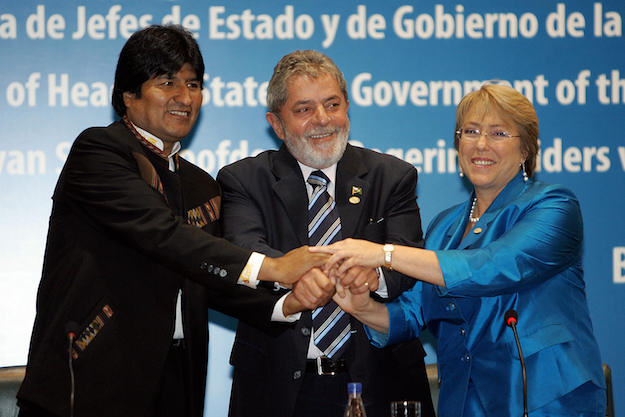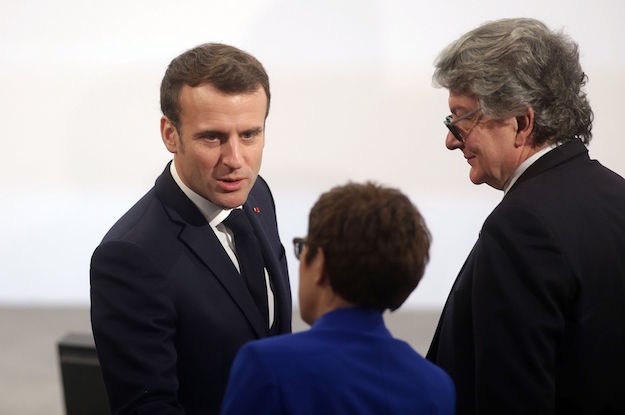On April 20, Argentina, Brazil, Chile, Colombia, Paraguay, and Peru informed the Union of South American Nations, the continental integration association commonly known as UNASUR, that they were suspending their membership for a year. While overlooked as a minor regional non-event by much of the Western media, this could have profound implications for South America.
Latin American countries almost never withdraw from regional organizations, let alone those created specifically to advance their collective international insertion. The astounding announcement from the six countries points to a worrying rise in the level of ideological friction within South America at a time when leaders are struggling to deal with the implosion of Venezuela and benign ignorance from Washington.
Although generally analyzed as an economic integration initiative, only the most optimistic of observers could ever have expected UNASUR to reach something remotely resembling the EU. Transportation and infrastructure linkages between the member countries are too thin to support large trade volumes. Moreover, there is little economic complementarity within South American and virtually nothing in terms of the integrated value chains that drive vibrant economic groupings such as ASEAN, the EU or NAFTA. But this was also never the point to the bloc.
UNASUR instead finds its origins in politics, specifically in the foreign policy of Brazilian president Luiz Inácio Lula da Silva. His idea was to get South American countries looking inwards for solutions, not constantly going hat-in-hand to the U.S. or Europe every time they faced a challenge. In the mid-2000s this was an easy sell to regional countries, many of whom were flush with cash from surging commodity prices and innovating with social policies that were rapidly reducing national poverty rates. Those countries such as Chile, Colombia and Peru that were less certain of the underlying anti-imperialist rhetoric sometimes linked to the project took comfort in Brazil’s constant use of UNASUR as a device to restrain and divert the excesses of its hard-left Bolivarian wing and thus retain regional credibility with global markets.
Perhaps the most important but understated contribution of UNASUR was its profusion of presidential and ministerial summits. While often strong on platitudes and thin on concrete deliverables, these meetings nevertheless performed an important function: they got the top regional decision-makers, irrespective of their particular ideological dispositions, in the same room on a regular basis so that they could simply talk. This in turn facilitated information sharing and offered ample opportunities to develop the mutual confidences that allowed irritants to be eliminated before they became crises.
True, there are other venues where regional leaders can meet, such as the Summit of the Americas, the Organization of American States, the Ibero-American Summit process, or even the Community of Latin American and Caribbean Nations (CELAC). But none of these venues offers the tight, intra-continental focus of UNASUR to the exclusion of competing external interests from players such as the U.S., Spain or even Mexico. Nor do they offer the frequency of meetings or the agility to rapidly convene emergency gatherings to address events such as Colombia’s 2008 violation of Ecuadorean sovereignty or the 2012 hyper-accelerated impeachment of Paraguayan president Fernando Lugo.
In this context the withdrawal from UNASUR by the six countries just a week after the contentious Summit of the Americas in Lima, Peru is worrying and points to a collapse in the critical consensus-generating imperative underlying the bloc. Unanimity on the Summit’s keynote issue of corruption was reached without any undue difficulty. What proved considerably more complicated was discussion about the crisis in Venezuela. Here, very sharp fault lines emerged between the hard-left Bolivarian grouping launched by Venezuela during the presidency of the late Hugo Chávez’s and a more centrist, market-oriented, pro-democracy group of countries that make up the Lima Group pushing for a restoration of democracy in Venezuela.
Reports from the Summit are stark. Leftist-led countries such as Bolivia and Nicaragua were forceful in their condemnation of Venezuela’s exclusion from the meeting; Ecuador, where new President Lenín Moreno has signaled a more market-friendly approach than his predecessor, hedged. The Bolivarian wing was also dedicated in its efforts to prevent any sort of concrete statement from the assembled leaders on the Venezuelan crisis. Dialogue on the topic consequently collapsed.
For the six withdrawing countries Venezuela has become a critical national security issue. Brazil and Colombia are struggling to cope with massive inflows of refugees fleeing a collapsed economy and spiraling crime and violence. Venezuelan migrant numbers in Argentina, Chile and Peru have also surged, creating a new range of immigration concerns historically unusual for the continent. For all six nations there is a pressing concern that Venezuela has become home to major transnational criminal networks that are the primary security threat in the region. Added to this is the reputational effect in international markets, which will see the instability in Venezuela as a stain that might spread, driving up borrowing costs and complicating market access for the rest of South America.
Much of the region’s challenges are transnational in nature, crossing the borders of countries leaning both left and right on the political spectrum. The potential collapse of UNASUR heralded by the April 20 withdrawal removes a key negotiation and coordination space where shared challenges in fields such as health, security and the environment were quietly managed. Moreover, it cements a hard left-right regional split that may make future cooperation extremely complicated. Joint action is going to be needed to deal not only with the ongoing Venezuelan disaster, but also complicated electoral cycles in Bolivia, Brazil, Ecuador, Guyana, and Suriname.
This weakening of UNASUR comes just as the grouping might be most needed. Historically, the U.S. has stepped in to coordinate regional actions. More recently Brazil has taken on this role. There is no single substitute for the leadership of either of these two countries, regardless of what ambitious pundits in Buenos Aires or Santiago might wish. With these two dominant countries on the sidelines, collective action and coordination is thus the only route to managing regional crises, which UNASUR’s impending collapse signals are becoming increasingly complicated and fraught processes.
—
Burges is a senior lecturer in international relations with the School of Politics and International Relations at the Australian National University








